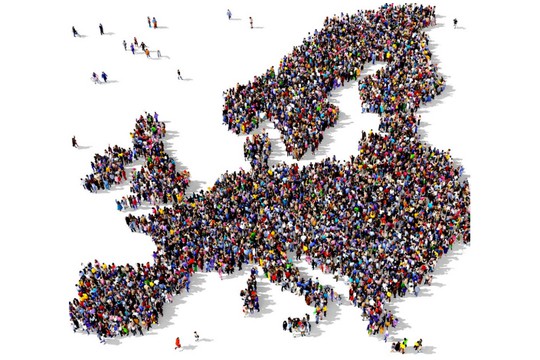Here is a map of Europe proposed by the European Commission
The Eurozone is in a technical recession, with first quarter GDP at -0.1%. It could be worse. The Russian war in Ukraine has packed a wallop on Europe with food prices rising and energy scarcity leading to closed factories and steel mills. But the worst-case scenarios for markets never played out precisely as the bear case presumed, writes ‘Forbs’.
Inflation is coming down, but still high. Energy prices are coming down due to slowing demand, but higher than pre-Covid. For investors, the German DAX +1.2% index and the French CAC are both up 13% and 9.7%, respectively, while the Dow is up only 1% year-to-date ending June 7. Investors had their chance.
The consumer price inflation in France declined to 5.1% year-on-year in May 2023, down from 5.9% in April and better than the 5.5% consensus.
Germany’s inflation is now 6.1%, its lowest level in 12 months.
UK inflation is in decline but still high at 7.8% as of April.
Europe’s inflation rates are all higher than that of Brazil, China, India and Saudi Arabia.
Electricity prices are falling in France and Germany but are higher than they were pre-Covid by a factor of three to four, causing the drag on Eurozone GDP.
In number terms, European Union GDP is producing less value than it did in 2021. Its unemployment rate is worse than the U.S. In some countries, it is nearly double that of the U.S. rate.
Germany and Belgium’s unemployment rate is around 5.6%.
France is 7.1%. Portugal is 7.2%. Spain is now an emerging market.
It’s unemployment rate is worse than Latin American countries at 13% as of the end of the first quarter.
The U.S. unemployment rate was 3.7% in May.
Colombia has 10% unemployment.
In a recently published report, the World Bank said there is now a “cost of living” crisis in Europe.
The war in Ukraine has significantly contributed to the crisis with refugee floods in poor states like Romania, the end of cheap gas, and the loss of Russian markets.
EU member Poland’s inflation is over 13% as of May, and unemployment is around 5%. It has been one of the country’s hardest hit by the inflow of Ukrainian migrants fleeing the war, according to the International Rescue Committee. Some 12 million refugees crossed into the Polish border since February 24, 2022 to spread throughout Europe, and 1.5 million remain in Poland.
“In terms of Europe’s outlook, I don’t see much good coming from there,” says Vlad Signorelli, head of Bretton Woods Research. “Regarding the NATO lockstep, I can’t think of any EU member country other than Hungary saying, ‘let’s stop sanctions and get this war over with’,” Signorelli says. Hungary’s leadership has been calling for this since July 2022. “Russian sanctions are not working as advertised,” Signorelli says.
German philosopher Oswald Spengler, writing in his classic takedown of Europe’s leaders titled “The Decline of the West” during World War I, said if Europe fails to build its own policy based on its citizen’s shared prosperity and economic security, risks of wars and civil unrest will ensue. Ukraine isn’t exactly in the EU, but it is part of Europe and on the EU’s doorstep. It is exacting a high price on Europe, surely more than what the war’s main cheerleader outside of Moscow – the United States – has had to pay.
As Europe’s biggest manufacturing country, Germany has taken a heavy toll from the destruction of the Nord Stream pipeline in September 2022, but also due to its own decision to stop using nearby gas and oil from Russia.
German Chancellor Olaf Scholz was booed by constituents recently, called a “war monger” as he grew increasingly angry, shaking fists and raised voice and all. He looked like a mad leader in a World War II documentary.
The Progressive Alliance of Democrats in the European Parliament held an event called "Feeding Europe in Times of Crisis" where they blamed the EU’s Green Deal strategy called “From Farm to Fork” for putting pressure on food production, and causing a spike in food prices. Some of the goals of that program include making 25% of EU agriculture organic and reducing nitrogen-based fertilizers by 20% by 2030. Incentives and a huge propaganda campaign would be needed to get people to lower animal protein consumption by at least 20% and reduce dairy consumption by around 10%.
European businesses are increasing against these climate change policies. Last year, Italy was ordered to pay UK-based oil and gas company Rockhopper more than €190 million for the Italian government’s refusal to grant an offshore oil concession in order to fight climate change.
The European Union was created mainly to serve the economic growth of the member states. But now the EU is more of an extension of the policy platforms put forth by the likes of Davos Man each year at the World Economic Forum.
Is Europe a growth story anymore? Few would say so.
The EU has been in a constant state of crisis and disarray since the 2009 PIIGS (Portugal, Italy, Ireland, Greece, Spain) crisis that centered on Greece possibly leaving the EU; then the UK actually going ahead with it and leaving in “Brexit”; then came China-style Covid restrictions and requirements; and now the Ukraine war, Forbs stresses.
read more in our Telegram-channel https://t.me/The_International_Affairs

 9:31 12.06.2023 •
9:31 12.06.2023 •























